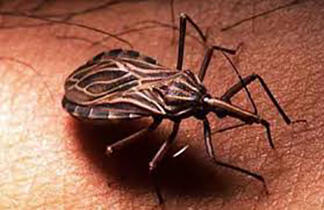
LSTM’s Seminar Series continued with a talk by Professor Igor C. Almeida, Director of the Biomolecule Analysis Core Facility and part of the Department of Biological Sciences at the University of Texas El Paso. His talk, entitled: Glycan-Based vaccine and biomarkers for Chagas disease was introduced by LSTM’s Dr Alvaro Acosta-Serrano.
Professor Almeida began with an introduction to Chagas disease, also known as American trypanosomiasis, a neglected tropical disease caused by the protozoan parasite Trypanosoma cruzi. It is transmitted to humans and other animals by the blood feeding “kissing bug”, contaminated blood products or organ transplantation, eating contaminated food or from mother to unborn child. Between 8-10 million people are chronically affected in Latin America with around 12-50,000 deaths annually, most from problems that the parasites cause within the ventricles of the heart. It is an emerging disease in USA and Europe, with 300,000 chronic cases in USA and 80,000 cases in Spain.
There are two drugs commonly used to treat the disease benznidazole (Bzn) and nifurtimox (Nfx). There is a high level of efficacy in the acute phase of the disease and a good level of efficacy in the chronic phase. However only 21% of cases receive treatment in Latin America, between 20-30% of patients suffer from side effects and there has been some resistance reported. This coupled with the fact that the drugs are not FDA-approved in the West and therefore hard to prescribe, and the fact that there are many people who do not have any symptoms at all the management of the diseases transmission is difficult. Most important to Professors Almeida’s talk is the fact that at this stage there is not vaccine for the disease.
He went on to describe the life-cycle of the parasite and the fact that it has a highly complex coat, covered by glycoproteins. This coat is highly variable depending on the host, changing in order to escape the host immunity, which has hampered the development of a human vaccine.
Professor Almeida discussed that in recent years his group, along with collaborators, have been studying the structural, biological and immunological aspects of glycosylphosphatidylinositol, gpi-anchored glycoproteins, which are major components of the parasites cell surface. He explained that by using number of techniques they have been working to identify proteins as potential targets for vaccine development, working to lower the number of proteins and peptides on which to carry out further work. Some of the parasite surface proteins are also decorated with alpha-galactose residues, which are highly immunogenic in humans and elicit a strong antibody response against this carbohydrate antigen. He then described how this has led to an understanding that the highly expressed human anti-alpha-Gal antibody is very protective against T. cruzi infection. Based on this work Professor Almeida and his group has been developing synthetic glycan-based vaccine candidates along with biomarkers for the follow-up of the chemotherapy of the disease.
He concluded by looking at the work that will now be carried out by the group in follow up to initial studies, in order to develop effective vaccine candidates that can be used along with other treatments to limit the transmission of Chagas disease and the damage that it causes.